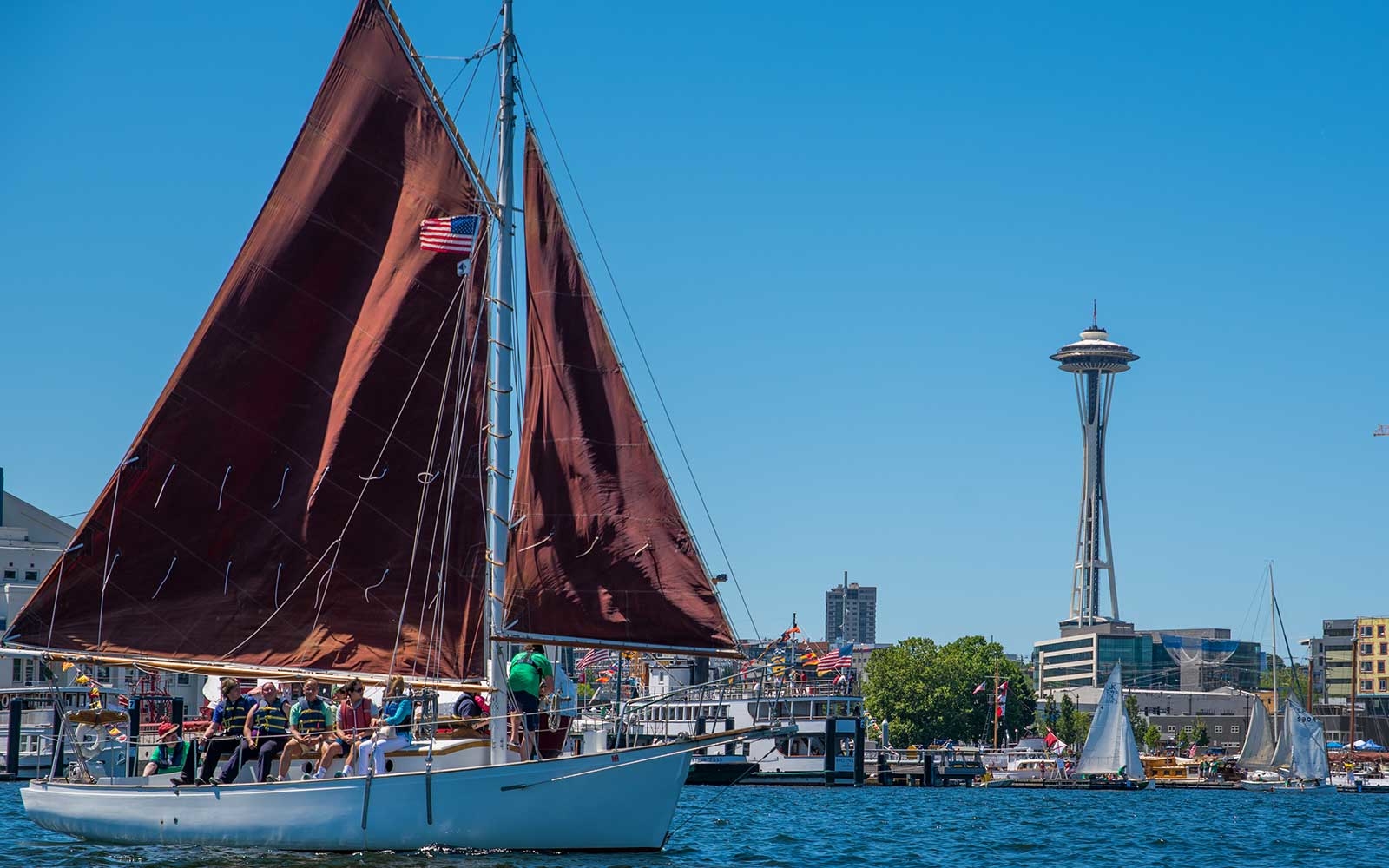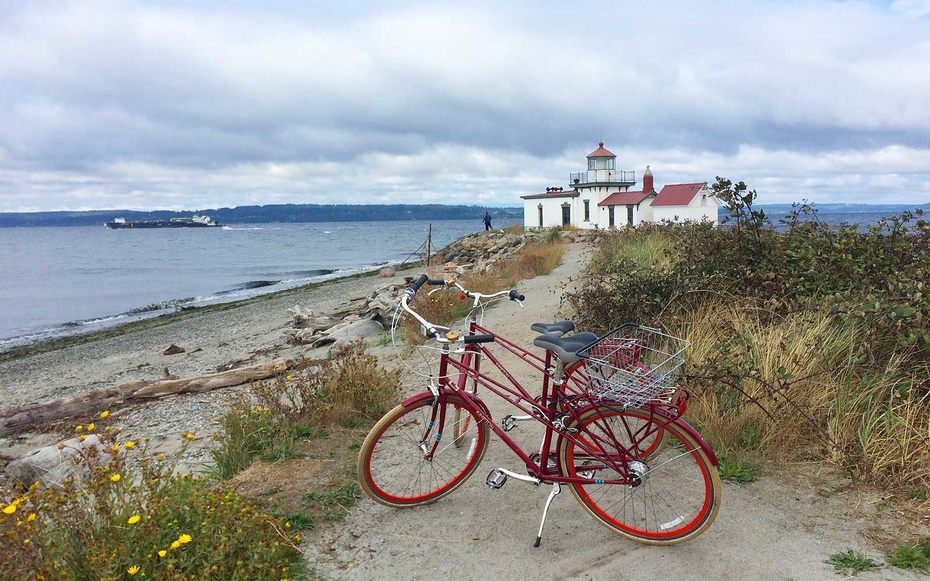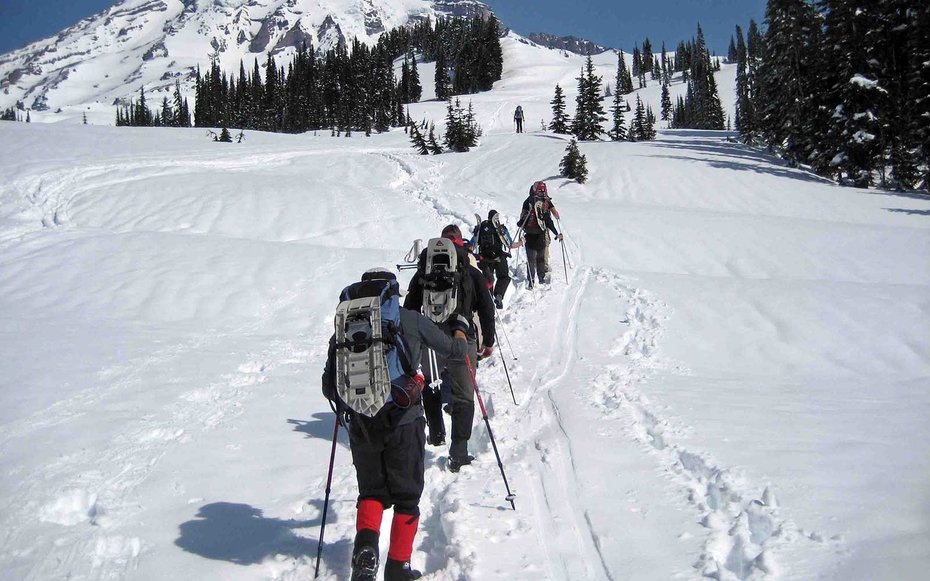 Javier_Cuevas_Nazario
Javier_Cuevas_Nazario
Seattle’s unrivaled urban-meets-natural landscapes can be easily explored without a car—if you take advantage of new transit options and pack a rainproof spirit of adventure.
At the confluence of high mountain ranges, lush forests and an archipelago of more than 100 islands, you have Seattle. It may be one of the most beautiful settings for cultural and outdoor pursuits, but deciding how best to spend a weekend here can feel like work, unless, it turns out, you do something outlandish like ditch the car.
While planning a recent trip, my mind wandered from Chihuly Garden to the pistachio semifreddo dessert at Tulio to the wineries of Woodinville and the snowy slopes of Mt. Rainier. Recalling a decade of family reunions in the suburb of Bellevue, where everyone drove to get anywhere, I expected my husband and I would need a car to cover a lot of terrain. But in the few years since I’ve been away, a slate of new transit options, guided tours and bike-friendly hotels—plus the 2014 launch of a bike-share program—have given locals and visitors some refreshing alternatives to driving in and out of the Emerald City. Seattle may lag behind other major U.S. cities when it comes to operating a widespread public transit system, however, there are glimmers of hope.
“Most of the city can now be reached by transit that arrives every 10 minutes,” said Scott Kubly, Director of the Seattle Department of Transportation. SDOT added that its new Move Seattle plan aims to have 75 percent of Seattlites commuting without a car by 2035 in order to achieve the city’s goal of being carbon neutral by 2050. Sound Transit is set to open a new light rail in spring 2016 from downtown to Capitol Hill and the University of Washington, and is at work on 36 miles of extensions that will connect the suburbs of Lynnwood, Bellevue, Redmond, Mercer Island and Federal Way by 2023. As of this fall, a new Regional Day Pass allows adults unlimited rides on the bus, train and ferry for $8. Inspired by the changes afoot, we said fuggedaboutthecar.
Here’s how to make the most of a car-free weekend in Seattle and beyond.
Ranked the eighth most bike-friendly city in the country, according to Bicycling magazine, Seattle has invested over $36 million in the cycling infrastructure in the past four years and opened more than 100 miles of bike paths. As the city rolls out new plans to quadruple the number of cyclists by 2030—adding 239 miles of greenways and 102 miles of protected bike lanes along the way—a visit to Seattle doesn’t feel complete without joining the burgeoning bike movement and reconnoitering on two wheels.
The Pronto Cycle Share operates a network of over 500 mint green bikes and 50 stations, and makes pedaling around town a no-brainer with rates at $8 for 24 hours or $16 for three days. Opt to stay at an eco-conscious hotel with complimentary bikes like The Maxwell Hotel or one of Kimpton’s four centrally located properties—Hotel Monaco, Hotel Vintage, Alexis and newly opened Palladian—where first-come-first-serve cruisers are well suited for a leisurely bike tour, be it a six-mile loop of Lake Union or a whole day. Keith Dowsing, chief concierge at Alexis hotel, is full of ride ideas—like ordering a Trickster IPA at Black Raven Brewery just off the Sammammish River Trail. If you want to know about a freshly paved greenway or the newest bike café, Seattle Bike Blog is your resource.
On a cool clear morning that only smelled like rain, we followed car-free Elliott Bay Trail along Puget Sound into bustling Myrtle Edwards Park, past Alexander Calder’s Eagle, and up inland, through gritty and green nooks hidden to those behind four doors. We rode by railroad tracks and around elegant Magnolia houses that overlooked the skyline until we reached Discovery Park. This 534-acre retreat is about six miles from downtown, but it might as well be a secret cove in Canada. As we coasted downhill, a lighthouse with maroon rooftops popped into view. Other than a seal swimming near the shore, there was no one else. Seeking shelter from the wind, we settled on a jetty by the lighthouse on the northernmost point of Elliott Bay, pulled out a sandwich from Pike Place Market’s Michou Deli and stayed awhile.

Despite being the second biggest wine producing state in the country, Washington has cultivated an offbeat boutique winery scene—just 30 minutes from downtown Seattle—where small-scale, family-owned operations comprise many of the area’s 120 wineries.
On a Woodinville Wine Tasting Tour ($125) with Evergreen Escapes, Patterson Cellar’s John Patterson poured a Late Harvest Roussanne in the back of a warehouse while praising Walla Walla and Red Mountain for being the best AVA’s in the state. Full-time dentist and winemaker Kit Singh sat at a table with six open bottles and shared the story behind his Lauren Ashton Cellars label. These cozy meetings aren’t by chance. Evergreen Escapes brings guests to three wineries over the five-hour tour, where the winemaker is always present. At Martedi Wines, the tour group of five sipped several varietals with Joseph Miglino and talked about the wild smack of aromatic and savory compounds like salami, leather, wet rocks and shower curtains, the chalky tannins in a Syrah and the surprisingly non-deterring diesel smell of a Riesling. When the tour ended, we headed back to our hotels in the bio-fueled Mercedes van, feeling perfectly inebriated and enlightened. It was hard not to smile, thinking how differently the day could’ve gone had we been the designated drivers following the tourist route to Chateau Ste. Michelle.
Hiking in Seattle is not so much a hobby as it is a way of life. Though the snow-capped peaks of the Olympic Range seem so close when eyed between the cracks of buildings, you can’t take a light rail there, at least not yet. To summit that most famous 14,409’ behemoth in the Cascades, book the 3-day Muir Climb on Mount Rainier ($1,451) with Alpine Ascents, the only guide service offering transportation from Seattle. The trip includes an instructional mountaineering course, tents and provisions. For a less extreme taste of the great outdoors, Evergreen Escapes leads year-round one-day outings ($225) to Mt. Rainier National Park and Olympic National Park, featuring naturalist-guided walks with wildlife and waterfalls, breakfast and a Cascadian Safari picnic lunch with wine. Spontaneous travelers will revel in Evergreen Escapes’ brand new Adventure Hub & Winery in downtown, where you can skim guidebooks, get high altitude weather reports, mingle with local outdoor experts— with a glass of wine in one hand and s’mores in the other—limber up with a yoga class and rent backpacking equipment.

With water making up 41% of the city, experiencing some kind of aquatic adventure in Seattle is de rigueur. Bainbridge Island is the local’s go-to choice for a breezy budget escape (the scenic ferry ride is 35 minutes and a roundtrip ticket is a mere $8), but as the boat pushes back from the terminal on a Saturday morning, you’ll look around at only a few dozen people leaning over the railing towards the looming skyline. While the 150-acre Bloedel Reserve and Bainbridge Island Brewing are a worthy 20-minute spin from the Bainbridge port, there are plenty of walkable diversions on Main Street just 10 minutes from the dock. Pick up a BLT sandwich with island-grown organic heirloom tomatoes and Washington-raised, heritage breed bacon from Hitchcock Delicatessen & Charcuterie and head to Back of Beyond’s hut in Eagle Harbor Marina to rent a canoe ($20/hour). Enjoy a floating picnic on Puget Sound, where you’ll paddle by striking waterfront homes draped in fog. Before returning to the ferry, stop in to cycling-inspired Eleven Winery for an $8 tasting or glass of Ratio Rosso. Back in Seattle, stroll or pedal over to nearby Local 360 to feast on a menu of American comfort food sourced from local producers within a 360-mile radius.
On Sundays, the Center For Wooden Boats offers a free hour-long public sail around Lake Union for up to 15 passengers, who are wise to arrive by 10am for first pick of the craft, be it steamboat, electric boat, schooner, ketch, yawl or yacht. Fuel an early start with a cappuccino from sustainable roaster Caffe Vita in the Queen Anne neighborhood not far from the boathouse. After getting your nautical and caffeine fix, the options for delicious farm-to-table bites are abundant—and more rewarding for those willing to bike a short distance—from Sitka & Spruce to Café Barjot to lakeside Westward.